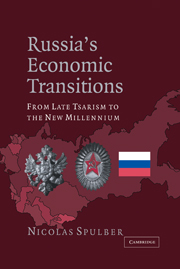Book contents
- Frontmatter
- Contents
- Figures and Tables
- Preface
- PART I THE TSARIST ECONOMIC TRANSITION
- PART II THE SOVIET ECONOMIC TRANSITION
- 10 The Socioeconomic Framework
- 11 The Transition Issues
- 12 The Economic Policies
- 13 The Problems of Agriculture
- 14 The Industrial Changes
- 15 Domestic and Foreign Trade
- 16 Money and Banking
- 17 State Finance
- 18 Overall View
- PART III THE POST-SOVIET ECONOMIC TRANSITION
- Index
12 - The Economic Policies
Published online by Cambridge University Press: 03 December 2009
- Frontmatter
- Contents
- Figures and Tables
- Preface
- PART I THE TSARIST ECONOMIC TRANSITION
- PART II THE SOVIET ECONOMIC TRANSITION
- 10 The Socioeconomic Framework
- 11 The Transition Issues
- 12 The Economic Policies
- 13 The Problems of Agriculture
- 14 The Industrial Changes
- 15 Domestic and Foreign Trade
- 16 Money and Banking
- 17 State Finance
- 18 Overall View
- PART III THE POST-SOVIET ECONOMIC TRANSITION
- Index
Summary
Agricultural Policy
The Soviet policies on agriculture, industry, trade, and finance cannot be properly understood without keeping in view the changing frameworks within which the Soviet leadership tried to handle the question of the relations between market and what they viewed as its antimony, namely socialism. Recall that under War Communism, the Bolsheviks, notwithstanding World War and Civil War destruction, attempted to transform the economy completely and eliminate from it market relations, which they considered the generators of capitalism. Under the ensuing insuperable necessity of coping with the economy's total collapse, the Bolsheviks resorted to the NEP, that is, to the restoration of market relations at the borders of the economy's “commanding heights,” which they kept firmly in their hands. They maintained the ensuing “mixed” system, defined by Lenin as state capitalism, until they perceived the achievement of full economic recovery. Afterward, Stalin engaged the country in a global planning and industrialization process aiming to transform Russia from an agricultural country into an industrial one on the basis of “socialist” dictatorship but with the use of variously controlled and distorted market relations. Finally, as multiple, complex, internal dislocations became increasingly hard to handle, the return to a kind of “mixed” economic framework of the NEP type appeared as indispensable to avoid if possible the expanding pressures for a direct transition to a market-directed economic system.
Let me sketch now the evolving agricultural policies within these frameworks.
- Type
- Chapter
- Information
- Russia's Economic TransitionsFrom Late Tsarism to the New Millennium, pp. 192 - 211Publisher: Cambridge University PressPrint publication year: 2003



